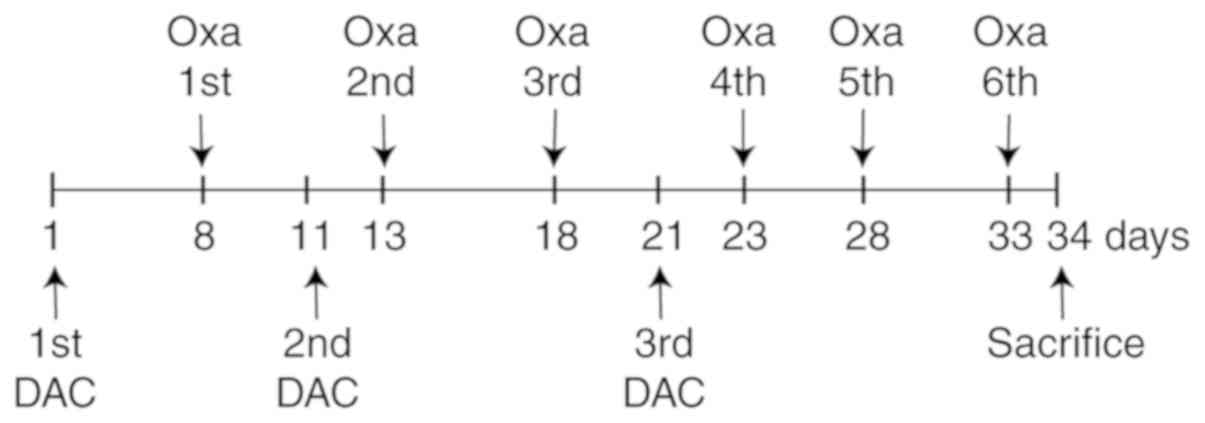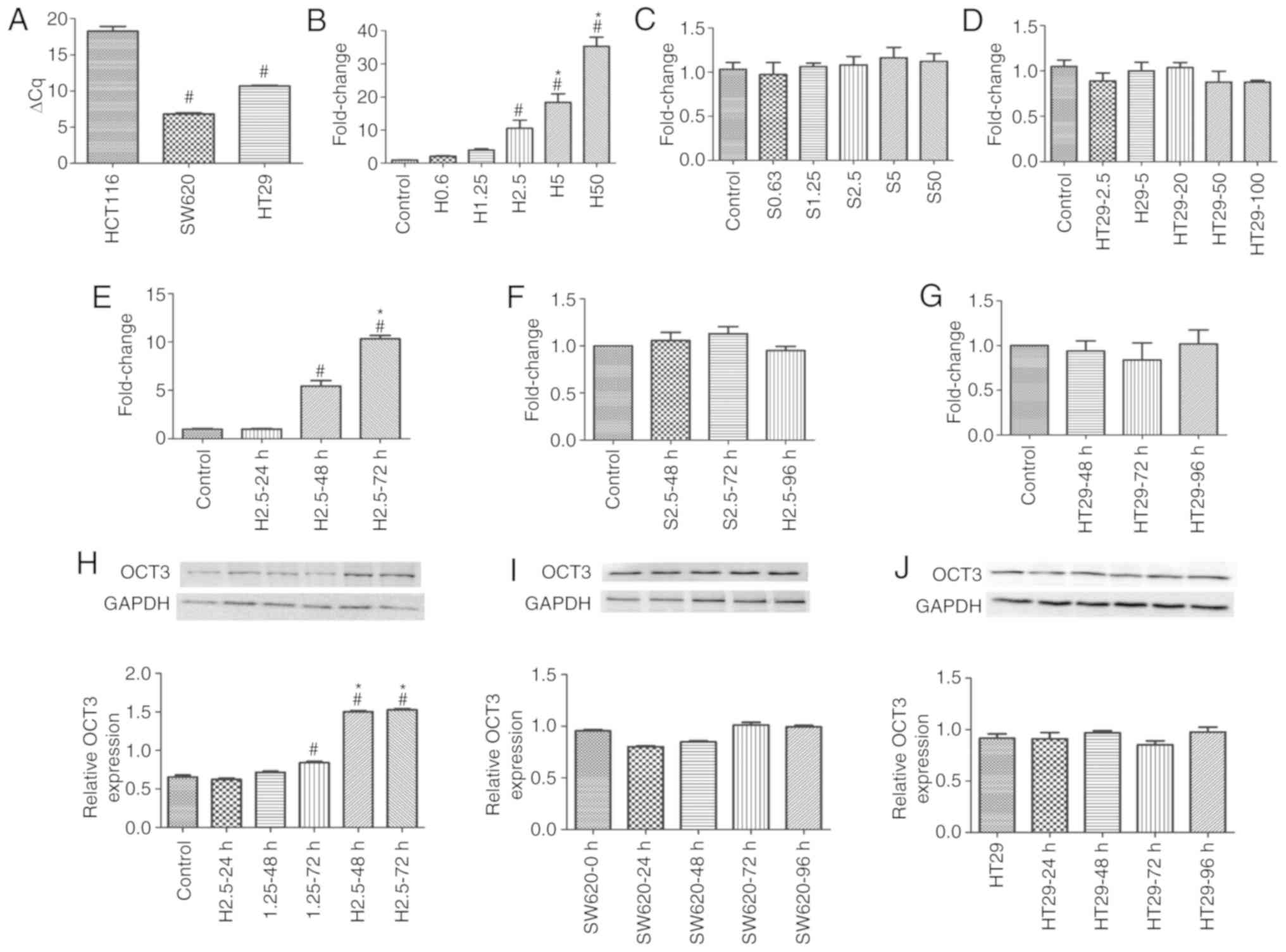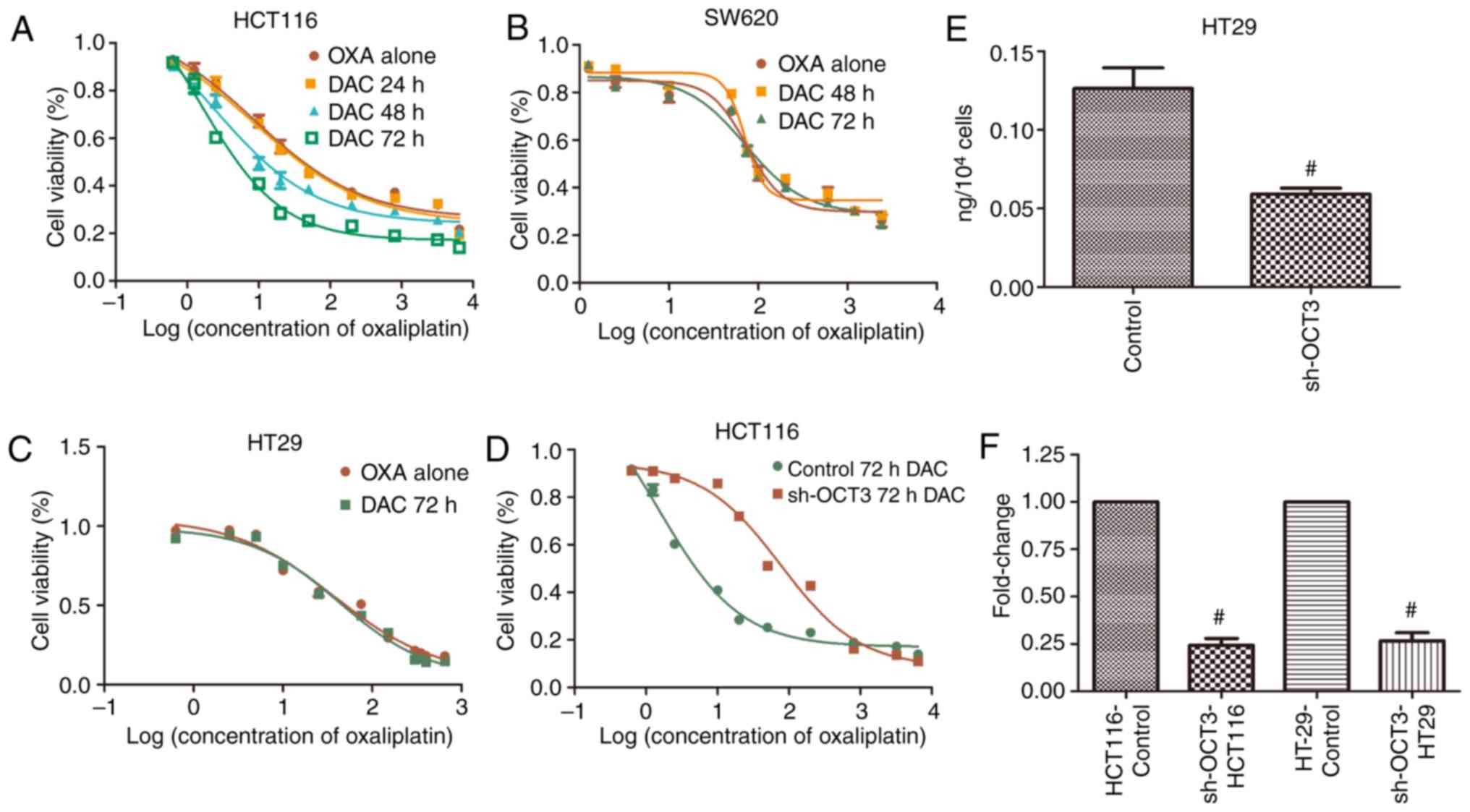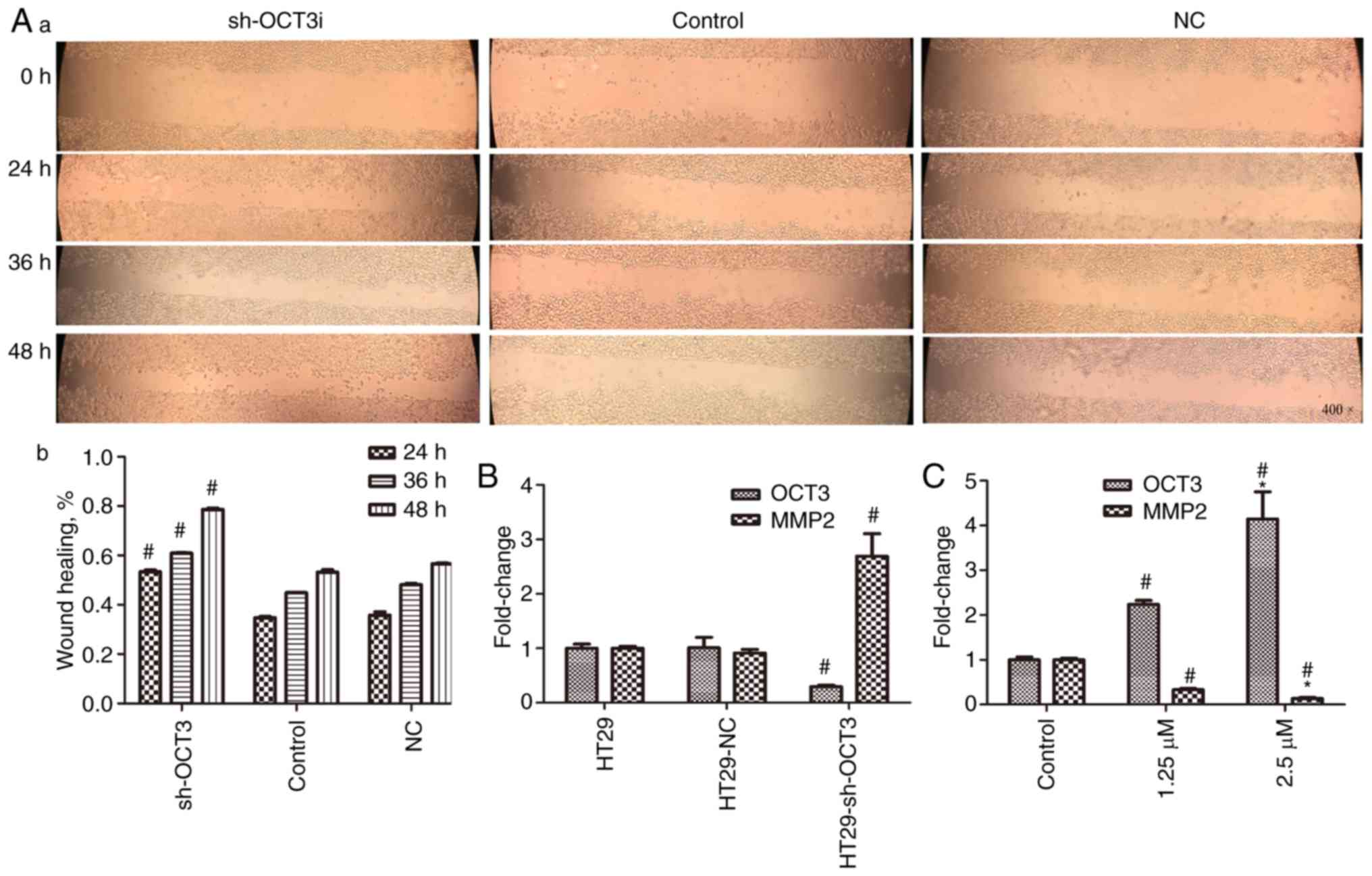|
1
|
Perego P and Robert J: Oxaliplatin in the
era of personalized medicine: From mechanistic studies to clinical
efficacy. Cancer Chemother Pharmacol. 77:5–18. 2016. View Article : Google Scholar : PubMed/NCBI
|
|
2
|
Martinez-Balibrea E, Martinez-Cardus A,
Gines A, Ruiz de Porras V, Moutinho C, Layos L, Manzano JL, Bugés
C, Bystrup S, Esteller M and Abad A: Tumor-Related molecular
mechanisms of oxaliplatin resistance. Mol Cancer Ther.
14:1767–1776. 2015. View Article : Google Scholar : PubMed/NCBI
|
|
3
|
Buss I, Garmann D, Galanski M, Weber G,
Kalayda GV, Keppler BK and Jaehde U: Enhancing lipophilicity as a
strategy to overcome resistance against platinum complexes. J Inorg
Biochem. 105:709–717. 2011. View Article : Google Scholar : PubMed/NCBI
|
|
4
|
Oguri T, Kunii E, Fukuda S, Sone K, Uemura
T, Takakuwa O, Kanemitsu Y, Ohkubo H, Takemura M, Maeno K, et al:
Organic cation transporter 6 directly confers resistance to
anticancer platinum drugs. Biomed Rep. 5:639–643. 2016. View Article : Google Scholar : PubMed/NCBI
|
|
5
|
Wu X, Kekuda R, Huang W, Fei YJ, Leibach
FH, Chen J, Conway SJ and Ganapathy V: Identity of the organic
cation transporter OCT3 as the extraneuronal monoamine transporter
(uptake2) and evidence for the expression of the transporter in the
brain. J Biol Chem. 273:32776–32786. 1998. View Article : Google Scholar : PubMed/NCBI
|
|
6
|
Koepsell H: Polyspecific organic cation
transporters: Their functions and interactions with drugs. Trends
Pharmacol Sci. 25:375–381. 2004. View Article : Google Scholar : PubMed/NCBI
|
|
7
|
Yokoo S, Masuda S, Yonezawa A, Terada T,
Katsura T and Inui K: Significance of organic cation transporter 3
(SLC22A3) expression for the cytotoxic effect of oxaliplatin in
colorectal cancer. Drug Metab Dispos. 36:2299–2306. 2008.
View Article : Google Scholar : PubMed/NCBI
|
|
8
|
Zhang S, Lovejoy KS, Shima JE, Lagpacan
LL, Shu Y, Lapuk A, Chen Y, Komori T, Gray JW, Chen X, et al:
Organic cation transporters are determinants of oxaliplatin
cytotoxicity. Cancer Res. 66:8847–8857. 2006. View Article : Google Scholar : PubMed/NCBI
|
|
9
|
Grisanzio C, Werner L, Takeda D, Awoyemi
BC Pomerantz MM, Yamada H, Sooriakumaran P, Robinson BD Leung R,
Schinzel AC, et al: Genetic and functional analyses implicate the
NUDT11, HNF1B, and SLC22A3 genes in prostate cancer pathogenesis.
Proc Natl Acad Sci USA. 109:11252–11257. 2012. View Article : Google Scholar : PubMed/NCBI
|
|
10
|
Vollmar J, Lautem A, Closs E, Schuppan D,
Kim YO, Grimm D, Marquardt JU, Fuchs P, Straub BK, Schad A, et al:
Loss of organic cation transporter 3 (Oct3) leads to enhanced
proliferation and hepatocarcinogenesis. Oncotarget.
8:115667–115680. 2017. View Article : Google Scholar : PubMed/NCBI
|
|
11
|
Xiong JX, Wang YS, Sheng J, Xiang D, Huang
TX, Tan BB, Zeng CM, Li HH, Yang J, Meltzer SJ, et al: Epigenetic
alterations of a novel antioxidant gene SLC22A3 predispose
susceptible individuals to increased risk of esophageal cancer. Int
J Biol Sci. 14:1658–1668. 2018. View Article : Google Scholar : PubMed/NCBI
|
|
12
|
Fu L, Qin YR, Ming XY, Zuo XB, Diao YW,
Zhang LY, Ai J, Liu BL, Huang TX, Cao TT, et al: RNA editing of
SLC22A3 drives early tumor invasion and metastasis in familial
esophageal cancer. Proc Natl Acad Sci USA. 114:E4631–E4640. 2017.
View Article : Google Scholar : PubMed/NCBI
|
|
13
|
Guo C, Ma J, Deng G, Qu Y, Yin L, Li Y,
Han Y, Cai C, Shen H and Zeng S: ZEB1 promotes oxaliplatin
resistance through the induction of epithelial-mesenchymal
transition in colon cancer cells. J Cancer. 8:3555–3566. 2017.
View Article : Google Scholar : PubMed/NCBI
|
|
14
|
Siegel R, Naishadham D and Jemal A: Cancer
statistics, 2013. CA Cancer J Clin. 63:11–30. 2013. View Article : Google Scholar : PubMed/NCBI
|
|
15
|
Kaiser C, Meurice N, Gonzales IM, Arora S,
Beaudry C, Bisanz KM, Robeson AC, Petit J and Azorsa DO:
Chemogenomic analysis identifies Macbecin II as a compound specific
for SMAD4-negative colon cancer cells. Chem Biol Drug Des.
75:360–368. 2010. View Article : Google Scholar : PubMed/NCBI
|
|
16
|
Luebeck GE, Hazelton WD, Curtius K, Maden
SK, Yu M, Carter KT, Burke W, Lampe PD, Li CI, Ulrich CM, et al:
Implications of epigenetic drift in colorectal neoplasia. Cancer
Res. 79:495–504. 2019. View Article : Google Scholar : PubMed/NCBI
|
|
17
|
Zhou C, Pan R, Hu H, Li B, Dai J, Ying X,
Yu H, Zhong J, Mao Y, Zhang Y, et al: TNFRSF10C methylation is a
new epigenetic biomarker for colorectal cancer. PeerJ. 6:e53362018.
View Article : Google Scholar : PubMed/NCBI
|
|
18
|
Chu CH, Chang SC, Wang HH, Yang SH, Lai KC
and Lee TC: Prognostic values of EPDR1 hypermethylation and its
inhibitory function on tumor invasion in colorectal cancer. Cancers
(Basel). 10:E3932018. View Article : Google Scholar : PubMed/NCBI
|
|
19
|
Yokoi K, Harada H, Yokota K, Ishii S,
Tanaka T, Nishizawa N, Shimazu M, Kojo K, Miura H, Yamanashi T, et
al: Epigenetic status of CDO1 gene may reflect chemosensitivity in
colon cancer with postoperative adjuvant chemotherapy. Ann Surg
Oncol. 26:406–414. 2018. View Article : Google Scholar : PubMed/NCBI
|
|
20
|
Li LC and Dahiya R: MethPrimer: Designing
primers for methylation PCRs. Bioinformatics. 18:1427–1431. 2002.
View Article : Google Scholar : PubMed/NCBI
|
|
21
|
Tanaka S, Hosokawa M, Ueda K and Iwakawa
S: Effects of decitabine on invasion and exosomal expression of
miR-200c and miR-141 in oxaliplatin-resistant colorectal cancer
cells. Biol Pharm Bull. 38:1272–1279. 2015. View Article : Google Scholar : PubMed/NCBI
|
|
22
|
Livak KJ and Schmittgen TD: Analysis of
relative gene expression data using real-time quantitative PCR and
the 2(-Delta Delta C(T)) method. Methods. 25:402–408. 2001.
View Article : Google Scholar : PubMed/NCBI
|
|
23
|
Cao LL, Pei XF, Qiao X, Yu J, Ye H, Xi CL,
Wang PY and Gong ZL: SERPINA3 silencing inhibits the migration,
invasion, and liver metastasis of colon cancer cells. Dig Dis Sci.
63:2309–2319. 2018. View Article : Google Scholar : PubMed/NCBI
|
|
24
|
Chen Z, Ji N, Wang Z, Wu C, Sun Z, Li Y,
Hu F, Wang Z, Huang M and Zhang M: Fine particulate matter
(PM25) promoted the invasion of lung cancer cells via an
ARNT2/PP2A/STAT3/MMP2 pathway. J Biomed Nanotechnol. 15:4162019.
View Article : Google Scholar : PubMed/NCBI
|
|
25
|
Shnitsar V, Eckardt R, Gupta S, Grottker
J, Müller GA, Koepsell H, Burckhardt G and Hagos Y: Expression of
human organic cation transporter 3 in kidney carcinoma cell lines
increases chemosensitivity to melphalan, irinotecan, and
vincristine. Cancer Res. 69:1494–1501. 2009. View Article : Google Scholar : PubMed/NCBI
|
|
26
|
Hsu CM, Lin PM, Chang JG, Lin HC, Li SH,
Lin SF and Yang MY: Upregulated SLC22A3 has a potential for
improving survival of patients with head and neck squamous cell
carcinoma receiving cisplatin treatment. Oncotarget. 8:74348–74358.
2017. View Article : Google Scholar : PubMed/NCBI
|
|
27
|
Hagiwara H, Sato H, Ohde Y, Takano Y, Seki
T, Ariga T, Hokaiwado N, Asamoto M, Shirai T, Nagashima Y and Yano
T: 5-Aza-2′-deoxycytidine suppresses human renal carcinoma cell
growth in a xenograft model via up-regulation of the connexin 32
gene. Br J Pharmacol. 153:1373–1381. 2008. View Article : Google Scholar : PubMed/NCBI
|
|
28
|
Qin T, Jelinek J, Si J, Shu J and Issa JP:
Mechanisms of resistance to 5-aza-2′-deoxycytidine in human cancer
cell lines. Blood. 113:659–667. 2009. View Article : Google Scholar : PubMed/NCBI
|
|
29
|
Hosokawa M, Saito M, Nakano A, Iwashita S,
Ishizaka A, Ueda K and Iwakawa S: Acquired resistance to decitabine
and cross-resistance to gemcitabine during the long-term treatment
of human HCT116 colorectal cancer cells with decitabine. Oncol
Lett. 10:761–767. 2015. View Article : Google Scholar : PubMed/NCBI
|
|
30
|
Zhao H, Zhu H, Huang J, Zhu Y, Hong M, Zhu
H, Zhang J, Li S, Yang L, Lian Y, et al: The synergy of vitamin C
with decitabine activates TET2 in leukemic cells and significantly
improves overall survival in elderly patients with acute myeloid
leukemia. Leuk Res. 66:1–7. 2018. View Article : Google Scholar : PubMed/NCBI
|
|
31
|
Egeblad M and Werb Z: New functions for
the matrix metalloproteinases in cancer progression. Nat Rev
Cancer. 2:161–174. 2002. View
Article : Google Scholar : PubMed/NCBI
|
|
32
|
Zhu XH, Wang JM, Yang SS, Wang FF, Hu JL,
Xin SN, Men H, Lu GF, Lan XL, Zhang D, et al: Down-regulation of
DAB2IP promotes colorectal cancer invasion and metastasis by
translocating hnRNPK into nucleus to enhance the transcription of
MMP2. Int J Cancer. 141:172–183. 2017. View Article : Google Scholar : PubMed/NCBI
|
|
33
|
Hu T, Wang L, Pan XL and Qi HL: Novel
compound, organic cation transporter 3 detection agent and organic
cation transporter 3 activity inhibitor, WO2015002150 A1: A patent
evaluation. Expert Opin Ther Pat. 26:857–860. 2016. View Article : Google Scholar : PubMed/NCBI
|
|
34
|
Pan X, Iyer KA, Liu H, Sweet DH and Dukat
M: A new chemotype inhibitor for the human organic cation
transporter 3 (hOCT3). Bioorg Med Chem Lett. 27:4440–4445. 2017.
View Article : Google Scholar : PubMed/NCBI
|





















